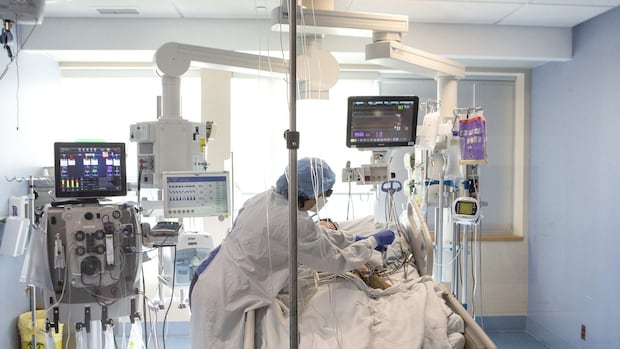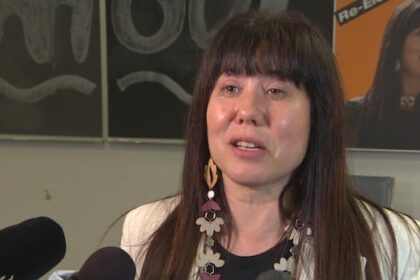Manitoba·NewManitoba’s plan to create a patient safety charter and legislate an end to mandatory overtime for health-care workers — along with certain staff-to-patient ratios — has garnered mixed reactions from advocates and experts.Not enough nurses to stop mandatory OT, say advocates and expertsCBC News · Posted: Nov 19, 2025 6:00 AM EST | Last Updated: 7 minutes agoListen to this articleEstimated 5 minutesThe audio version of this article is generated by text-to-speech, a technology based on artificial intelligence.Earlier this year, the provincial government announced it had hired 481 nurses since April 2024, but the Manitoba Nurses Union questions that number. (Chris Young/The Canadian Press)Manitoba’s plan for changes to the health-care system, which it says will improve patient safety, has garnered mixed reactions from advocates and experts.Tuesday’s speech from the throne promised to create a patient safety charter, end mandatory overtime for health-care workers, and implement staff-to-patient ratios in priority areas.But many say the system still doesn’t have enough health-care professionals to support changes in legislation.“We’re almost jumping the gun here,” Manitoba Nurses Union president Darlene Jackson told CBC News, arguing more nurses are needed if the province wants to eliminate mandatory overtime hours.Earlier this year, the province announced it had hired 481 nurses since April 2024, but Jackson questions that stat.“I have nurses coming to me and asking, ‘Where are they?’” she said.Manitoba Nurses Union president Darlene Jackson says the province is ‘almost jumping the gun’ in some of its promises, claiming the system still doesn’t have enough health-care professionals to support the proposed changes. (Travis Golby/CBC)Speaking to reporters after the throne speech, Premier Wab Kinew insisted the system does have enough nurses and “that’s why we’re moving forward with this.”“I’m confident that those on the front lines are doing their job. We need the administration to do their job now, and there will be standards,” he said.Jackson says her members still aren’t noticing a difference when it comes to late shifts, patient loads and vacancies, pointing to a 37 per cent nursing vacancy rate at the obstetrics unit in Thompson.She questioned the preparedness of the health-care system and overall timing of the announcement.“I would love, love love nothing better than to see an end to mandating [overtime] but I don’t think we’re in a position now where we can legislate an end … and still have a functioning health-care system,” Jackson said, adding that the culture in the system continues to be a problem.“Changing culture would definitely affect retention. Once we have recruited enough nurses and we can retain them, then … we’ll be able to end mandatory overtime at that point.”Sonia Udod said she continues to hear from the health-care sector about the challenges of keeping newly-graduated registered nurses in the workforce. (Submitted by Sonia Udod)Sonia Udod, an associate professor of nursing at the University of Manitoba, agreed there’s “good and bad” in the announcement.“Who will take care of the patients when there are no nurses to take over?” Udod said. “I’m not sure how that’s going to happen.”Udod said she continues to hear from the health-care sector about the challenges of keeping newly-graduated registered nurses in the workforce, even though Manitoba nursing schools have increased the number of enrollment slots.“They’re afraid. They’re scared. They’re doubtful, and they’re not sure how to manage that demanding and unpredictable work environment,” she said of recent graduates.Progressive Conservative health critic MLA Kathleen Cook called Kinew’s assertion that the health-care system had enough nurses “wild.”“I think it’s pretty clear that we don’t. Anyone who’s visited a Manitoba hospital lately will tell you that,” Cook said.Manitoba PC health critic MLA Kathleen Cook says Kinew’s assertion the health-care system has enough nurses to support his proposed changes is “wild.” (Justin Fraser/CBC)She also questioned how the province intends to enforce and implement an end to mandatory overtime.The Manitoba Association of Health Care Professionals agreed it wouldn’t have enough staff either.“Mandatory overtime is something that is extremely problematic for all areas of allied health,” said president Jason Linklater, adding that a plan that addresses gaps in training in rural areas would be a better solution.His union represents about 7,000 health-care professionals, including emergency dispatchers and rural paramedics, physiotherapists and respiratory therapists.As for the throne speech pledge to create a patient safety charter “enshrining into law your right to good health care,” Udod called that “just words.”“I think that’s a great idea. But again, how is that going to be enforced?”The president of Doctors Manitoba, Dr. Nichelle Desilets, appeared optimistic about the province’s promises, but added their success hinges on proper consultation and planning.“We have to find a way to meaningfully implement it,” she said specifically about the safety charter.The promise to legislate staff-to-patient ratios in priority areas of the health-care system is something Manitoba Health Coalition’s director Noah Schulz is encouraged by.However, he said he would need to see more details.Doctors Manitoba president Dr. Nichelle Desilets said the success of the province’s proposed changes hinges on proper consultation and planning. (Submitted by Doctors Manitoba)Kinew said the “priority areas” would be determined at a later time but hinted that emergency rooms could be among the first.Jackson, however, expressed concern over legislating ratios for only selected areas of health care, saying it wouldn’t be fair to everyone.“That really worries me, because our community has been working extremely hard to ensure that we are going to provide numbers for every unit,” she said.“If you’re a patient in long-term care, if you’re a patient that’s accessing home care, if you’re a patient in acute care, you deserve to be looked after by a nurse who is following and working in a schedule that follows the minimum nurse-patient ratios.”Other health-care related announcement from the throne speech include the introduction of digital health cards and the launch of a new patient portal where Manitobans can access immunizations and lab results.with files from Ian Froese and Rosanna Hempel
Thursday, 5 Mar 2026
Canada – The Illusion
Search
Have an existing account?
Sign In
© 2022 Foxiz News Network. Ruby Design Company. All Rights Reserved.
You May also Like
- More News:
- history
- Standing Bear Network
- John Gonzalez
- ᐊᔭᐦᑊ ayahp — It happened
- Creation
- Beneath the Water
- Olympic gold medal
- Jim Thorpe
- type O blood
- the bringer of life
- Raven
- Wás’agi
- NoiseCat
- 'Sugarcane'
- The rivers still sing
- ᑲᓂᐸᐏᐟ ᒪᐢᑿ
- ᐅᑳᐤ okâw — We remember
- ᐊᓂᓈᐯᐃᐧᐣ aninâpêwin — Truth
- This is what it means to be human.
- Nokoma











